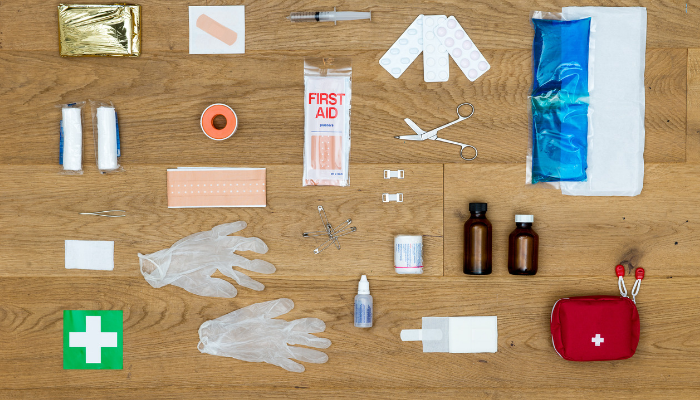It’s advisable to keep a fully equipped first aid kit at home and work. You cannot predict when an accident might occur. If an incident happens and you have a first aid kit on hand, you will be able to administer medical treatment to the wounded individual right away.
Here are the things you need to buy for your first aid kit refills.
-
Antibiotics
Washing and dressing a wound is essential, but you must also defend against infections.
-
Plasters
A plaster, also known as an adhesive bandage, can be used to cover minor scrapes and cuts. They are available in several sizes and forms for regions such as the fingers, elbows, and heels.
-
Bandages
Bandages are only useful when applied appropriately. It would be best to use various bandages for a particular function, such as retaining hefty dressings against a cut or holding a fractured limb; using a bandage that is not appropriate for the occasion would not be as effective as desired.
-
Roller Bandages
The most widely used form of bandage is a roller bandage. This bandage is typically formed from a long cohesive piece of breathable and lightweight cotton gauze and is mainly used to keep dressings over wounds.
-
Triangular Bandages
Triangular bandages are one of the most adaptable bandaging forms found in a first aid kit. They are intended for use in the construction of slings to hold soft tissue damage and stabilise fractured bones.
-
Tubular Bandages
Tubular bandages are the least adaptable of the three traditional bandages. However, they offer compression; you can use it to stabilise or hold elbow and knee joints and, in rare situations, also to retain a covering towards a limb.
-
Cold Compresses or Pack
Bruises, strains, and sprains require cold therapy. Consider using an ice-holding wrap to keep a cold pack in place for the prescribed 10-15 minutes so that neither the responder nor the victim has to hold the pack.
-
Thermometer
You should include a thermometer for measuring the body’s temperature in a first-aid kit. An oral thermometer is most likely the best option. In-ear digital thermometers are also accurate but also costly.
-
Cleansing Wipes
In your first aid kit refills, don’t forget to buy some stock of cleansing wipes that are alcohol-free. This product is ideal for cleaning blood and grime from the skin. Furthermore, their aqueous state facilitates washing, preparing the area for a dressing or more medication.
-
First Aid Manual
A first aid manual is an essential part of any first aid pack. It instructs you on how to get through various emergency circumstances. While attending a first aid course is vital, having a handbook on hand will remind you of the basics in case of an emergency.
-
First Aid Instruments
First aid instruments are essential and should be well-stocked and ready to use.
-
Scissors
Scissors help cut bandages to fit injuries and remove coverings so you can replace the bandages, lowering the chance of infection.
-
Tweezers
If you love doing outdoor activities such as hiking, having tweezers is a must-have in your first aid kit. A clean and fresh pair of tweezers is your friend in safely removing a tick or a splinter.
-
Tongue Depressors
Tongue depressors, also known as spatulas, are used to depress the patient’s tongue during clinical exams and give clear views of the mouth and the throat.
-
Flashlight and Extra Batteries
A well-stocked emergency kit and a well-thought-out disaster plan are essential for survival.
Flashlights are a necessary aspect of any survival pack since they provide light if no other light source is available, much safer than exposed candles.
After a hurricane or other natural calamity, electricity may be off for several hours or perhaps the entire day.
-
List of Emergency Numbers or Hotlines
If you have the list of emergency numbers, you will know how to call emergency responders when an incident occurs when first aid isn’t enough.
First-aid kits enable you to respond to a medical crisis as fast as possible. In an incident, even a one-minute delay might inflict irreversible harm. These kits provide primary and immediate medical care for typical medical ailments.
Author Bio:
Alison Lurie is a farmer of words in the field of creativity. She is an experienced independent content writer with a demonstrated history of working in the writing and editing industry. She is a multi-niche content chef who loves cooking new things.

